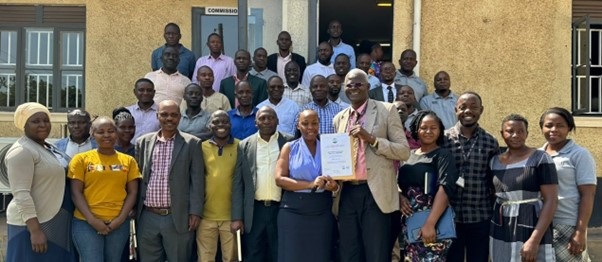
Kampala, Uganda | THE INDEPENDENT | Uganda’s Directorate of Government Analytical Laboratories (DGAL) has attained accreditation to the international standard for testing and calibration in laboratories.
Uganda and Zimbabwe’s Central Veterinary Laboratory (CVL) have been receiving support of the IAEA and the United Nations Food and Agriculture Organization (FAO).
Achieving this accreditation is a goal for many testing and calibration laboratories within Africa as it demonstrates competence; increases confidence among clients; and enhances the prospect of attracting resources by providing paid services and therefore contributing to the sustainability of such laboratories.
Accredited laboratories also help food traders to access and sustain national and international markets. In the face of limited resources, national testing and calibration laboratories such as Directorate of Government Analytical Laboratories (DGAL) in Uganda must explore mechanisms to attract funds to facilitate routine operations and ensure sustainable service-delivery.
A statement from international Atomic Energy agency said support provided by the IAEA, in cooperation with the FAO, has helped to strengthen Directorate of Government Analytical Laboratories capabilities. Accredited laboratories also help food traders to access and sustain national and international markets. The laboratory is now capable of regularly testing foods such as chicken for chemical hazards and can provide end-users with more reliable analytical test results, creating greater consumer confidence.
Directorate of Government Analytical Laboratories attained ISO17025:2017 accreditation of 14 tests including techniques for determining residues of pesticides in fruits and vegetables; persistent organic pollutants in fish and meat, as well as toxic metals such as lead.
Other tests include microbiology, toxicology, and DNA testing by six sections of the laboratory. This accreditation is for four years starting February 2024, enhancing confidence among users of the laboratory’s services, nationally and internationally.
Maintaining the accreditation means that laboratories must improve their quality management system as this is a requirement from accreditation to re-accreditation. “The path to accreditation can be long and demanding, requiring rigorous training of personnel, establishment of equipment handled by well trained personnel. We thank IAEA’s support in the process” said Kepher Kuchana Kateu, Director of Directorate of Government Analytical Laboratories.
“Excellence in analytical service delivery is required to maintain this status beyond the four years and we are determined to keep the standards and provide laboratory leadership in the country and the region,” Kateu said.
Directorate of Government Analytical Laboratories (DGAL) plays a critical role in investigations including in forensics, poisoning, paternity tests and food safety.
“With the IAEA’s support, which includes installation and building capabilities for routine use of an inductively coupled mass spectrometer as well as the establishment of a laboratory information management system, the status of those laboratories is expected to be significantly enhanced and to maintain this status to remain credible,” says Anna Grigoryan, Programme Management Officer at the IAEA’s Department of Technical Cooperation,
*****
URN
 The Independent Uganda: You get the Truth we Pay the Price
The Independent Uganda: You get the Truth we Pay the Price






Can you make test for wheat grain bi products bran and pollard